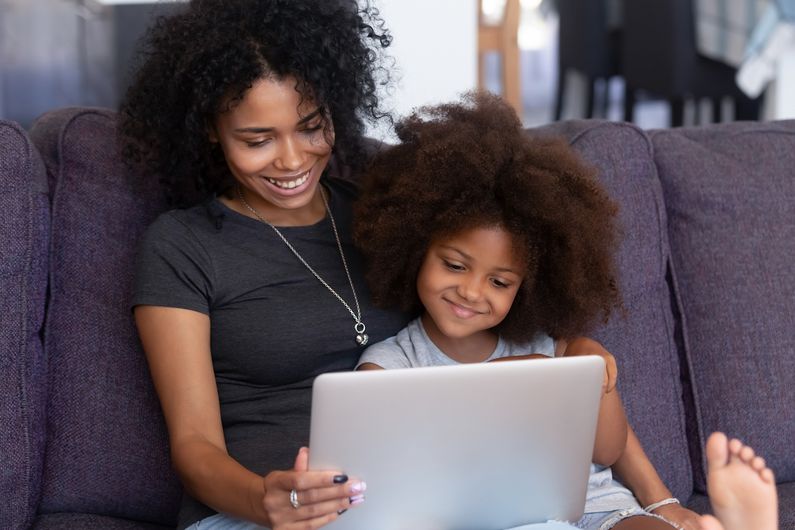Your children's screen time during confinement
- UdeMNouvelles
04/14/2020
Stuck at home because of distancing rules for COVID-19, parents should plan the next day's activities the night before so that their children spend less time in front of their screens.
Stay-at-home parents often worry about the amount of time their children spend in front of their screens. And with good reason. One movie here, two or three video games there, and soon the limits recommended by the experts at the Canadian Pediatric Society and American Academy of Pediatrics go out the window.
Now that confinement has been intensified by government-imposed social-distancing rules over COVID-19, the preoccupation parents have with their kids and screens has gotten even greater.
"They're already worried in normal times, so imagine now!” said Linda Pagani, a professor at Université de Montréal’s School of Psychoeducation and researcher at the CHU Sainte-Justine Research Centre. “I get a lot of emails about this, and I think I can help."
As a psychologist, she wants to reassure parents.
"We're currently living in exceptional circumstances,” she said via Zoom, the online videoconferencing platform. “We have to adapt. The expert recommendations were not developed based on the current situation."
She encourages parents to limit how often their kids are in front of the television or on their smartphone. Ideally, she said, preschool children shouldn’t spend more than one hour a day looking at screens and children aged six and over no more than two hours a day.
"This does not include time on the iPad for learning or writing," Pagani added.
There are indeed risks to young people's well-being because of overexposure to screens in early childhood, she said.
"For example, it can impair the development of social skills, lead to feelings of depression and may even partly explain the high body-mass index in some people. Early childhood is a critical time for a child's development.”
Technology can also be beneficial in the current situation, she added — for example, by helping alleviate kids’ lack of social interaction.
"It's a difficult time for people to adapt,” Pagani said. “There's a lot of anxiety, and what helps lessen that is social contact. As a psychologist, I am sensitive to this need. Having social interactions is very important for developing brains — adults’, too. We are all social beings.”
In her view, parents need to be creative and use technology wisely to try to meet the experts’ recommendations on screen time. "The way to do this is to plan the day before so that the next day is already organized when you wake up,” Pagani said.
Be kind and share
There are two other things parents should remember to practice during confinement to get through it in good mental and physical health, the psychologist said: altruism and sharing family meals.
“Psychologists have long known the benefits of altruism and pro-sociality," Pagani said. “I encourage parents to capitalize on this fact. They should plan a certain amount of time each day for altruistic communication with friends and acquaintances. Isolated people will need human contact during the crisis. Older people are a priority right now because they often live alone and are more concerned about their well-being than others are.”
In her previous research on the family environment, Pagani has also highlighted the importance of the family meal. "Why is it only at Easter, Christmas and Thanksgiving that we eat together at a table without phones and TV? " she wondered.
In her opinion, this crisis is a good time for parents to plan each meal so that everyone in the household can eat and share together. “It’s an opportunity for parents to instill good manners that value the well-being of the group rather than just the individual.”
Dare to set rules
Her advice is to plan the full day's program, taking care to include physical activities, social interaction, and time for learning, play and creativity. “This will ensure that the two-hours-a-day rule on screen-time for school-aged children will be broadly respected," she said. “The same is true for the time allotted to preschoolers. “
And parents, don’t worry: It's no big deal if you can't get things right down to the minute, Pagani added. Don't panic if the child spends a little more time than expected in front of the screen. The important thing is to set a schedule and divide up screen time according to whether it is for work or leisure — and also share screen time with friends.
"Whether it's Zoom or Skype, the important thing is to have healthy interactions,” Pagani said.
“It's all about focusing on the things you can control, organizing yourself and your family's activities. You have to try to have a planned schedule so that you can keep your bearings despite the disadvantages of confinement. That way you have a sense of control."
She also strongly advises planning physical activities as a way to counteract the effects of stress.
“Physical activity allows the body to release endorphins, and endorphins are associated with well-being. Being active with our children is a way to help relieve harmful stress for all of us.”
In short, the idea is to act as if the kids had to go to school, by giving a rhythm to their days even if the situation is exceptional,” she said. “Otherwise, young people will confuse confinement with being on vacation.”
Parents should dare to establish rules but also be flexible, she added. "With a well-structured schedule, you can adapt fairly quickly and balance screen time with other types of activities.”













